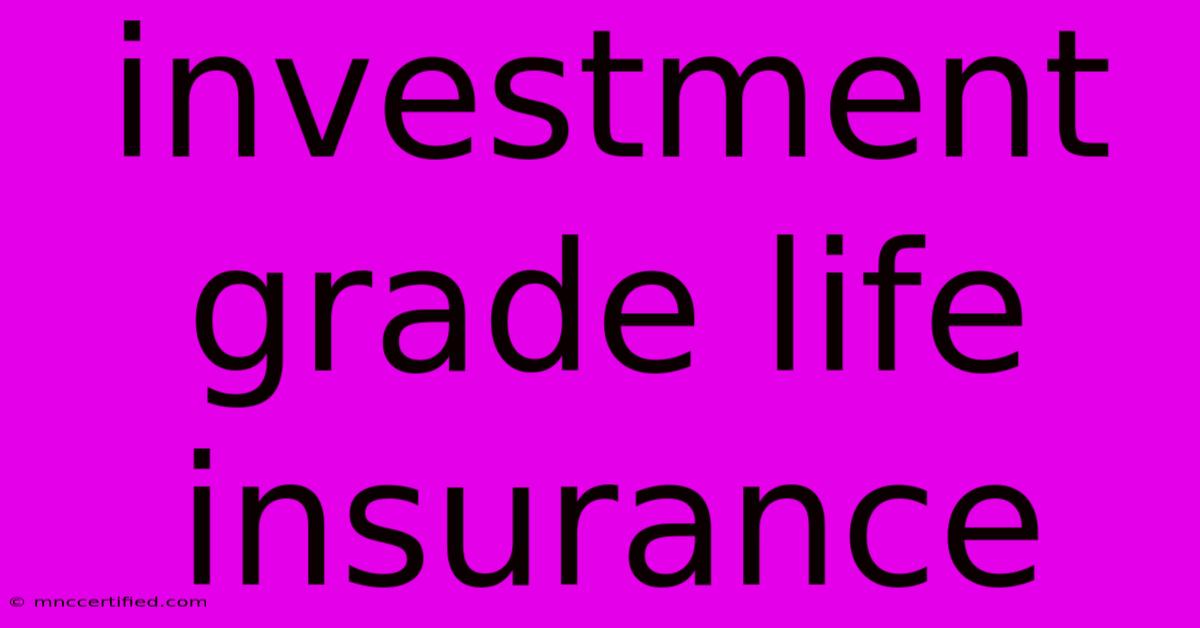Investment Grade Life Insurance

Table of Contents
Investment-Grade Life Insurance: A Secure Path to Wealth Building
Life insurance is often seen as a simple death benefit. However, for the financially savvy, investment-grade life insurance represents a powerful tool for wealth building and legacy planning. This comprehensive guide explores the intricacies of these sophisticated policies, detailing their advantages, disadvantages, and suitability for various financial goals.
What is Investment-Grade Life Insurance?
Investment-grade life insurance, encompassing both permanent life insurance (whole life, universal life, variable universal life) and annuities, goes beyond providing a death benefit. These policies offer the ability to build cash value that grows tax-deferred, creating a powerful investment vehicle alongside the life insurance coverage. The growth potential varies based on the policy type and the underlying investment options.
Key Characteristics of Investment-Grade Life Insurance:
- Cash Value Accumulation: A significant portion of your premium payments builds cash value, growing tax-deferred. This is a key differentiator from term life insurance, which only provides a death benefit.
- Tax Advantages: The growth of cash value within the policy is tax-deferred, meaning you only pay taxes when you withdraw the money. This can significantly boost your long-term returns.
- Investment Options: Some policies, particularly variable universal life (VUL) and variable annuities, offer the opportunity to invest your cash value in various market-linked products, potentially achieving higher returns than traditional savings accounts.
- Death Benefit: A guaranteed death benefit is still payable to your beneficiaries upon your death. The amount depends on the policy type and premium payments.
- Liquidity: While access to cash value may involve fees, it offers a degree of liquidity compared to other long-term investments.
Types of Investment-Grade Life Insurance
Several types of permanent life insurance offer investment features:
1. Whole Life Insurance:
- Guaranteed Cash Value Growth: Offers a fixed rate of return, providing predictable cash value growth.
- Lower Risk: Less susceptible to market fluctuations compared to other investment-grade life insurance options.
- Higher Premiums: Typically requires higher premiums than other types due to the guaranteed cash value growth.
2. Universal Life Insurance:
- Flexible Premiums: Allows for adjustments in premium payments based on your financial circumstances.
- Variable Interest Rates: Cash value growth fluctuates with the interest rates offered by the insurance company.
- More Control: Provides more control over the cash value accumulation and death benefit.
3. Variable Universal Life Insurance (VUL):
- Market-Linked Investments: Offers the opportunity to invest cash value in various sub-accounts, mirroring market performance.
- Higher Risk & Higher Potential Returns: Potential for higher returns but also exposes you to market risk.
- Requires Investment Knowledge: Requires understanding of investment risk and making informed decisions about sub-account allocations.
4. Annuities:
- Guaranteed Income: Designed to provide a stream of guaranteed income during retirement.
- Tax-Deferred Growth: Cash value grows tax-deferred until withdrawal.
- Various Types: Offers different options like fixed annuities, variable annuities, and indexed annuities, each with its own risk profile and return potential.
Advantages of Investment-Grade Life Insurance
- Tax-Deferred Growth: Allows for significant tax savings on investment gains.
- Estate Planning: Can help minimize estate taxes and efficiently transfer wealth to heirs.
- Liquidity: Provides access to cash value for various needs, including retirement planning, college funding, or unexpected expenses.
- Guaranteed Death Benefit: Offers a safety net for your loved ones in case of your untimely death.
- Protection from Creditors: In many jurisdictions, cash value within life insurance policies is protected from creditors.
Disadvantages of Investment-Grade Life Insurance
- Higher Premiums: Generally more expensive than term life insurance.
- Fees and Expenses: Policies often have associated fees, which can impact overall returns.
- Investment Risk: Some policies, like VUL, involve investment risk that could result in lower than expected returns.
- Complexity: Understanding the policy features and investment options can be challenging.
- Lack of Liquidity: Accessing cash value can sometimes be restricted or involve penalties.
Is Investment-Grade Life Insurance Right for You?
Investment-grade life insurance is a complex financial product. Its suitability depends on your individual financial goals, risk tolerance, and long-term financial planning. It's crucial to consult with a qualified financial advisor to determine if it aligns with your specific circumstances. They can help you choose the right type of policy and manage your investment strategy within the policy.
Keywords: Investment-grade life insurance, permanent life insurance, whole life insurance, universal life insurance, variable universal life insurance (VUL), annuities, tax-deferred growth, wealth building, legacy planning, estate planning, financial planning, retirement planning, death benefit, cash value, investment options, risk tolerance, financial advisor.

Thank you for visiting our website wich cover about Investment Grade Life Insurance. We hope the information provided has been useful to you. Feel free to contact us if you have any questions or need further assistance. See you next time and dont miss to bookmark.
Featured Posts
-
Premier League Leicester City Chelsea Highlights
Nov 24, 2024
-
Dental Hygienist Insurance Jobs
Nov 24, 2024
-
American Risk Insurance Lawsuit
Nov 24, 2024
-
Colorado Vs Kansas Arrowhead Showdown
Nov 24, 2024
-
Marshall Insurance Lancaster Nh
Nov 24, 2024